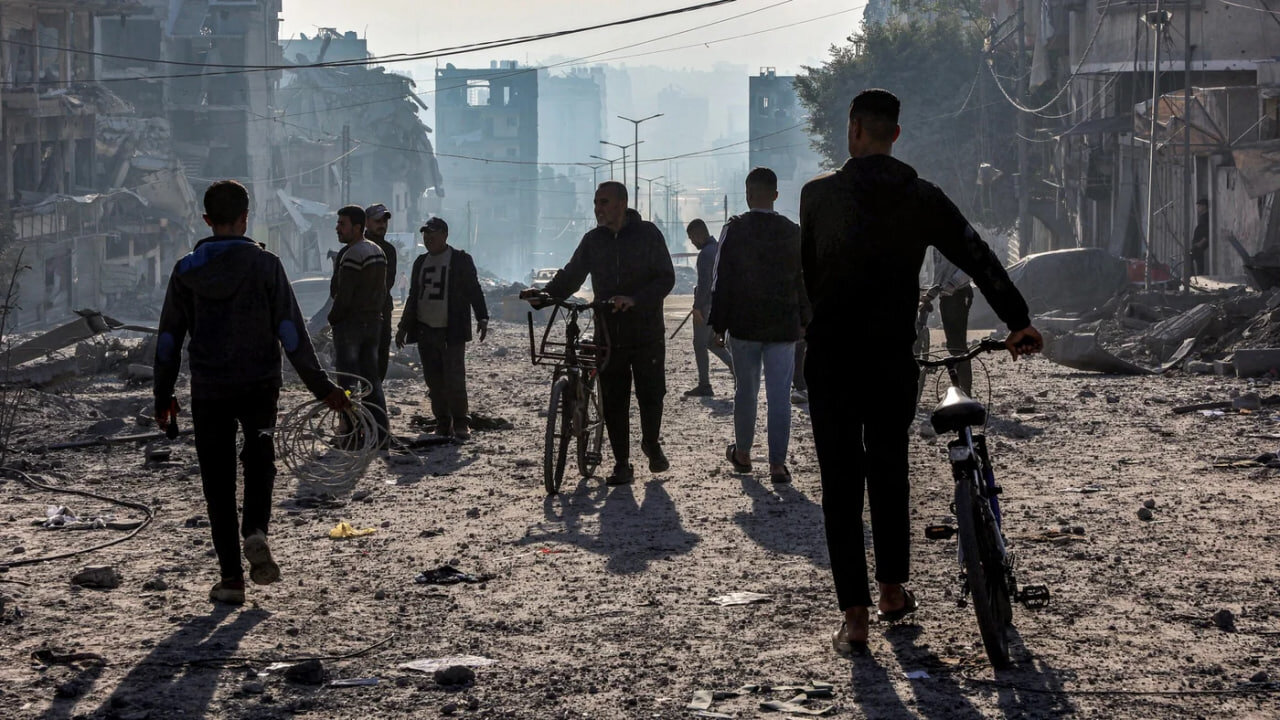Israeli officials struggle to conceal frustrations as Gaza truce nears
Israeli officials struggle to conceal frustrations as Gaza truce nears
A ceasefire deal between Israel and Hamas is at its closest point, according to officials involved in negotiations in Doha.

With expectations that an announcement is immininent, Majed al-Ansari, Qatar’s foreign ministry spokesperson, said that final details were being discussed on Tuesday.
“Negotiations are taking place on final details but we have ironed out the main obstacles,” he told a news conference.
“Today we are closest to any time in the past to a deal. The situation is still fluid but we are all upbeat.”
Joe Biden, the outgoing US president, said an agreement would “free the hostages, halt the fighting, provide security to Israel and allow us to significantly surge humanitarian assistance to the Palestinians”.
A Palestinian source close to discussions told Reuters that he expected a deal to be finalised on Tuesday “if all goes well”.
The incoming Donald Trump administration appears to have played a significant part in negotiations, according to multiple reports in Israeli media.
Haaretz reported that Steven Witkoff, Trump’s Middle East envoy, last week told Prime Minister Benjamin Netanyahu’s aides that he would be arriving in Israel on Saturday afternoon.
The aides said that was the middle of the Sabbath and the meeting would need to occur in the evening, which reportedly was “of no interest” to Witkoff, who pressed ahead with the meeting regardless.
A senior Israeli diplomat told Haaretz that Witkoff, a Jewish real estate investor without a diplomatic background, “charges ahead unusually aggressively”.
The Times of Israel reported, citing two Israeli officials, that the meeting between Witkoff and Netanyahu was “tense”.
It said that while the prime minister wanted a deal bringing about only a temporary truce, the agreement being finalised would include second and third phases, making it harder for Israel to resume hostilities.
Ben Gvir threatens resignation
Both Witkoff and Brett McGurk, Biden’s Middle East envoy, attended talks in Doha hosted by the Qatari prime minister on Tuesday.
David Barnea, the director of the Mossad intelligence agency, and Ronen Bar, director of the Shin Bet internal security agency, are representing Israel during the talks.
The first stage of the proposed deal would involve the release of 33 captives held in Gaza, including children, women (some of whom are soldiers), men above 50 and the wounded and sick, according to an Israeli official cited by Reuters.
A Palestinian source said the first phase would include the release of 1,000 Palestinian prisoners held in Israeli prisons.
Talks to reach an agreement for the second phase of the deal, intended to end the war, would reportedly take place around two weeks after the first phase begins.
The deal is expected to involve a phased withdrawal of Israeli troops from Gaza, including along the so-called Philadelphi Corridor on the border with Egypt, and the so-called Netzarim Corridor in central Gaza.
Netanyahu previously stated in the summer that Israeli control over the Gaza boundary with Egypt was critical and would remain indefinitely.
A deal will also involve a return for displaced Palestinians to northern Gaza, though it is not yet clear what kind of security arrangement Israel would agree to north of the strip.
Middle East Eye could not immediately independently verify the details of the proposed deal.
The agreement being discussed has been heavily criticised by senior figures on the Israeli far right, with National Security Minister Itamar Ben Gvir threatening to resign if it is agreed.
“The deal that is being formed is terrible,” Ben Gvir wrote on X.
He said it included the release of “terrorists” from prisons and to northern Gaza, and Israeli withdrawal from the Netzarim Corridor. He said the deal was “effectively erasing the war achievements that have been achieved with much blood by our fighters”.
Ben Gvir added: “I call on my friend, Finance Minister Bezalel Smotrich, to join me in full cooperation against the terrible deal being crafted, and to inform the Prime Minister clearly and firmly that if the deal goes through, we will resign from the government together.”
The national security minister said he would not bring down Netanyahu, but that resigning was “our only chance” to prevent the deal being implemented.
Smotrich described the deal as a “catastrophe”.
“This is the time to continue with all our might, to occupy and cleanse the entire Strip, to finally take control of humanitarian aid from Hamas, and to open the gates of hell on Gaza until Hamas surrenders completely and all the hostages are returned,” the far-right finance minister wrote on X.
It is not yet clear if Smotrich will resign from the government - a move that would likely bring down Netanyahu’s far-right coalition.
More than 46,000 Palestinians, the majority of whom are women and children, have been killed by Israel’s war on Gaza since October 2023.
(Middle East Eye)
source: tehrantimes.com